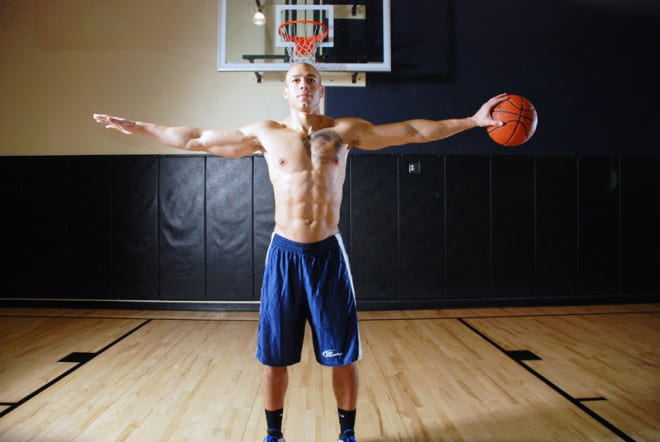 If you are an athlete like most others, you never feel like you’ve maximized your potential, no matter your skill level. That is basically true for all athletes in all sports, including basketball. More practice means more skill, which in turn means better performance.
If you are an athlete like most others, you never feel like you’ve maximized your potential, no matter your skill level. That is basically true for all athletes in all sports, including basketball. More practice means more skill, which in turn means better performance.
Probably you work hard practicing indoors and outdoors, shooting hoops at all angles and distances. With your basketball in-hand you probably travel great distances to play and practice with other skilled athletes who can help you improve your own skills. You’ve likely improved your ball handling skills, developed your shooting and passing ability, and you’re still working hard on the court to become a better rebounder.
But did you think about maintaining a diet plan to improve your performance by enhancing training, speeding recovery and decreasing illness?
Think about it again. Food and diet have huge impact on your body. Balanced diet is what you need to influence your health and athletic performance – including stamina and endurance.
The purpose of Nutrition for Basketball players:
- Provide the necessary energy for the body to maintain bodily functions well.
- Keep the physical condition fit and retain ideal weight.
- Adequate supply of water, and macro and micro-nutrients should be consumed throughout the day, although most players place greater emphasis on pre-game nutrition.
- Keep you focused on a planned and routine life
The daily diet of a player should contribute 55-60% carbohydrate, 25-30% fat and 10-15% protein.
Example: A player weighing 70kg needs 4000-5000 calories a day. (Depending on your metabolism, this is a standard measure).
Standard daily average macro-nutrition intake recommended for a player of average body weight around 70 kg:
- Carbohydrates: 55-60% calories 600 grams 2400
- Lipids or fats: 25-30% 1000 calories 112 grams
- Protein: 10-15% 600 calories 150 grams.
These amounts should be divided amongst several different food groups to insure the player also gets a wide variety of micro-nutrients (vitamins and minerals).
Depending on the quantities consumed diets higher or lower caloric content according to individual needs are achieved.
Combining food, varied menus are made for different days of the week. Basketball players differ from sedentary to present higher energy consumption and therefore energy requirements will be increased.
Do not forget that the important thing is to maintain regular eating habits that do not have to be modified quantitatively or qualitatively before a competition.
As general rules during training and matches must take into account:
- Eating 3 to 4 hours earlier before the game.
- Avoid difficult to digest and flatulent food.
- Do not try new diets before a competition
- You should not eat to satiety; calorie content should be 300-500 calories.
- The diet should be rich in carbohydrates and low in fat and salt.
- Drink adequate fluid.
Below is a list of recommendations for pre-game dieting.
Proper Hydration
Proper hydration is as important as nutrition to prevent injuries and to achieve adequate physical performance.
Under normal conditions there is a balance between water intake and water loss, but in situations of exercise, the magnitude of loss is increased considerably depending on factors such as:
- Intensity and duration of exercise
- Environmental temperature
- Relative humidity
- Percentage fat weight
- Age and sex
- Sportswear
- Hydration and nutrition prior
- Level of physical training.
Fluid Replacement Guides
In general, fluid replacement guidelines depend on the environmental conditions and duration of exercise, and must always have individual specifications. The amount of fluids to replenish must be based on the losses calculated by weight difference before and after exercise. Do not expect to be thirsty to drink. Thirst means you are already dehydrated.
The important concept is to avoid dehydration and embrace re-hydration; start early!
Don’t Forget to Drink Lots of Water
In general we can start with the ingestion of water 500-600 ml
Before competition or training (15 to 30 minutes), for the same drink 150-250 ml every 15 to 20 minutes after the game or during practice drink 500-1000 ml.
Under normal basketball conditions, water is sufficient. During high intensity games, the extended duration of training sessions and games, or when experiencing high temperatures, these conditions necessitate added electrolytes and sugars in your beverages.
In these cases drinks should be isotonic or hypotonic (low in electrolytes and sugars).
Supplementation
Supplements are important factors to keep the diet balanced diet during basketball game. Creatine and caffeine are considered great performance supplements that actually work, but they do have downsides in that they can increase the risk of dehydration and cramping. Neither supplement will provide conclusive results, individuals may benefit from experimenting with their use.
Creatine helps to increase levels of phosphocreatine in muscle, thus facilitating the generation of more ATP. ATP is the fuel needed to perform the exercises at high intensity – fuel destined to develop and strengthen muscle.
Caffeine reduces the perception of tiredness and fatigue by stimulating the nervous system and improving muscle and thermoregulatory function, the recommended dose is 2-6 mg / kg, given that the maximum effect is achieved after 60 minutes of intake.
Recommended diet after exercise
- The key will be to recover the body’s glycogen stores and re-hydrate, so fluid replacement and carbohydrate intake (HC) should start within 20 minutes following exercise.
- Immediately after exercise athletes should start drinking carbohydrates in a concentration of 6% / liter of water, though it is not harmful to consume plain water to relieve thirst.
- When the appetite is restored, athletes should choose foods rich in HC high-moderate glycemic index, trying to consume 9-10gr / kg body weight in the following activity 24 hours.
- The optimum rate of intake of HC is 50 gr / 2 hours, but in practice this may not always be so in the last meal should include sufficient amount of HC that mitigates the subsequent period of fasting. For example they should take about 150 g of HC for a period of 6 hours.
- You should avoid foods rich in fat and protein especially the first 3 hours after exercise.
Conclusions
In conclusion, every basketball player even any other athlete, should choose their food to best improve and enhance their performance. Dietary patterns such as fluid intake will have to be completely individualized by a dietitian, according to the individual physiology of the athlete.
Tags: basketball, competition, Diet, exercise, food, games, hydration, nutrition, Sports, water










